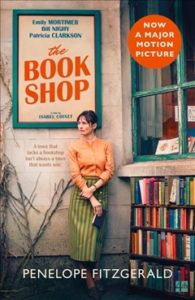
I was drawn to buy Penelope Fitzgerald’s novel, ‘The Bookshop’, because of the arresting image on the cover of actress Emily Mortimer as the novel’s heroine, Florence Green. Mortimer is dark, attractive, bookish, brooding, in stylish retro orange shirt and striped skirt standing outside a quaint small-town bookshop (which, let’s face it, every lover of books has once or twice fantasised about owning). The novel was published in 1978 but is set in 1959 Britain, in the small East Anglian town of Hardborough. The novel has been reissued a number of times, most notably in 1997 where it was reviewed favourably in the New York Times.
If I thought the novel was going to be actually about opening a bookshop, I was sorely disappointed. If I thought it was going to be about a strong, independent woman standing up to sexist forces against her, I would also be wrong. Why it has now been chosen as material for a film, is also perplexing to me. What does it have to say to audiences in 2018? If the crowd of women of, shall we say, a certain age at my local cinema is any indication, it is presented as one of those quirky films about starting over in a picturesque place somewhere like rural France, Tuscany, a Greek island etc. etc. meeting resistance, and finally being accepted. Casting Bill Nye as the curmudgeonly recluse who warms to Florence, suggests the filmmaker intended to move the film in this direction, but I think she was trying to be faithful to the source material, so this felt false and was, quite frankly, excruciating.

So back to the novel. I found this short novel (156 pages) to be extremely frustrating, continually subverting expectations. It was nominated for the Booker prize in 1978 (Fitzgerald won it the following year for ‘Offshore’), surprising for such a weird, inconsistent and improbable tale. Many critics view it as a comedy of manners but I think this misses the mark – there are certainly comedy-of-manners aspects to it, the society party thrown by Violet Gamart where Florence is subtly belittled, is one, as is the bizarre tea party between Florence and Mr Brundish (Bill Nye’s character) – but the tone veers wildly from comedy to realism to satire, even to the supernatural, so that the reader is pretty much always at sea.
Speaking of sea, I find it quite interesting that the covers for the earlier editions depicted scenes of nature at the seaside (the film, also has Florence often sitting on the wintery beach when, really, she should have been running her bookshop!) In the book she only goes once or twice, but these scenes are very brief and she is certainly not a communing with nature, again the reader/viewer wants Florence to be something that Fitzgerald is just not going to let us have.
No character in ‘The Bookshop’ is without flaws, even Florence herself. The most venal is Violet Gamart, who, on a whim, wants the building that Florence has bought and partially renovated, for her own pet project of an arts centre. Florence stands her ground but then seems to forget she has created an enemy. Raven, who is a nature man, gets the sea scouts he leads to help Florence through putting up shelves and painting, yet he also sets up an eleven-year-old paid assistant for her resulting in Florence falling foul of labour laws (Florence has previously worked in a big bookshop where she met

her late husband so she should have known better). We also meet Miles North, a BBC type, who spends his time in a cottage with his girlfriend avoiding actually doing any work. Miles is weak, is emotionally abusive to his girlfriend, and a sycophant to Violet, yet Florence inexplicable befriends him, and even, when she loses Christine her underage assistant, agrees to employ him part time (Why would someone who works for the BBC want to work for Florence, especially as we know he is a lazy sod? Why would Florence employ him when we know, at this stage, she is in financial difficulties? Why would any bookshop owner in her right mind order 250 copies of ‘Lolita’ to sell in a small town? Why would a bank manager lend Florence the money to purchase the premises when everyone in town knows it is riddled with damp?) There are many improbabilities that pile up to conspire against Florence. She meanwhile contents herself with writing silly letters to her lawyer and being duped by everyone. Mr Brundish in a fairly ineffectual way tries to warn Florence but she remains oblivious. He takes it upon himself to confront Violet – the only positive act in the novel to help Florence – but in a final stroke to frustrate and annoy the reader, this comes to nothing.
The final sentence, I suppose reveals Fitzgerald’s cynical and satirical intent: ‘As the train drew out from the station she sat with her head bowed in shame, because the town in which she had lived for ten years had not wanted a bookshop.’ No, Florence, wrong. You are not a heroine, not a fighter for a greater purpose, you are the victim of the malice of one privileged person and your own passivity and misplaced trust. You are a fool who acted on a whim, and didn’t have the sense or fortitude to carry it through. It is quite clear that the town did want a bookshop, as initially the shop did well. Florence made some bad decisions on the stock, the people she employed, and the condition of the building. If anything, this is a cautionary tale of capitalism: it’s dog eat dog and you have to be tough to survive. That’s why we all dream of owning a bookshop, and leave the actual running of them to people who know books are a commodity. Poor Florence.

